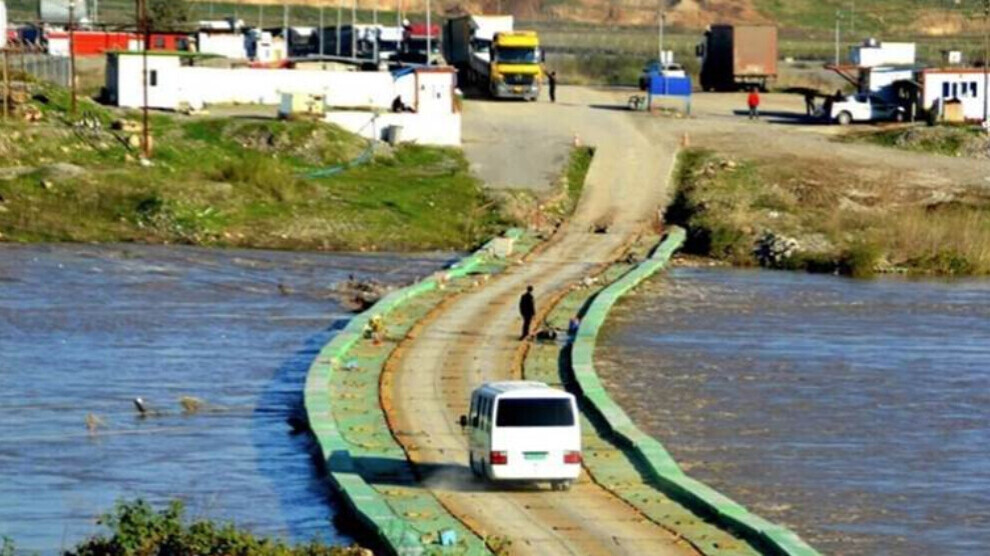The Semalka Border Crossing issue and its actors
New regulations have been introduced by a MIT-KDP alliance for the Semalka border crossing between Rojava and South Kurdistan, where there have been constant problems since 2013.
New regulations have been introduced by a MIT-KDP alliance for the Semalka border crossing between Rojava and South Kurdistan, where there have been constant problems since 2013.

Problems have been experienced since 2013 at the Semalka Border Crossing, which is the only crossing between South Kurdistan (Bashur) and West Kurdistan (Rojava). The ruling Kurdistan Democratic Party (KDP) in Bashur has recently introduced new regulations for the border crossing which mostly remains closed.
The new regulations came after the Turkish state's threats to the region, pointing to a KDP-Turkey alliance. Some sources state that the KDP is obliged to obey the Turkish state.
ONE OF THE MOST IMPORTANT CROSSINGS IN REGION
Semalka, one of the most important border crossings for North and East Syria, is located between Bashur and Rojava. Medicine-medical materials and food are constantly transported to the region via this crossing.
Patients also use this crossing for the treatment of diseases. Those who fought against ISIS and were injured also go to South Kurdistan for treatment.
WHAT HAPPENS DURING PASSAGE?
What does a person who wants to cross from Rojava to Bashur encounter? The documents of the people whose procedures have been completed at the Semalka Border Crossing are first submitted to the Faysh Khabur (other side of the border crossing) administration. After a response is received, people first go to the authorities on the other side of the border, in Faysh Khabur, to complete the procedures, and they are asked to fill out a form.
After completing and submitting the form, some questions (those not found in the form) are asked by an official. Then she/he goes to a room and is interviewed by two people there. If she/he does not answer questions, she/he is either insulted or told that she/he will be deported and never be allowed to cross the border again. It is guessed that the people who conduct interrogations are the officials of the Turkish intelligence service (MIT).
FORMS
Moreover, people are arbitrarily kept waiting for hours. Some of them are told to return now and come back later on the grounds that the completed form will be reviewed in a few days.
Very interesting questions are posed in the form given by the Faysh Khabur administration. These are mother's grandfather's father's name, spouse's grandfather's name, tribe, ethnicity, old home address, etc. People are faced with questions that seem like riddles that they have never encountered before.
PEOPLE ARE UNCOMFORTABLE
Citizens say that they are very disturbed by the practices they are subjected to by the Faysh Khabur administration. “We are also Kurds like them. Why are they treating us like that? Enough is enough.”
BEATEN FOR SAYING 'HEVAL'
Young people and women are particularly uncomfortable with the practices of the KDP administration. A young person from Rojava who wanted to cross from Faysh Khabur to Semalka said that he was beaten for using the word 'Heval' (“Comrade” in Kurdish).
Those who have been subjected to the illegal violations of the KDP and their relatives strongly condemn these practices and urge the relevant parties to solve this problem immediately.
THOSE WHO FOUGHT AGAINST ISIS ARE NOT DENIED PASSAGE
SDF, YPG and YPJ fighters, who were injured putting up spectacular resistance against ISIS, are prevented from crossing into Bashur and receiving treatment. Those who help the wounded in Bashur are also threatened by the KDP forces.
IF THE CROSSING IS CLOSED
The North and East Syria region, which is under an embargo because of the closure of the Til Koçer Border Crossing, may experience further difficulties if the Semalka Border Crossing remains closed. Following the mistreatments by Bashur authorities, the Rojava administration decided to close the crossing last June. However, some blamed the Rojava administration which closed the crossing in rejection of the arbitrary practices. The Rojava officials responded by saying, “We want our people to come and go with dignity.”
The Semalka administration put forward the following reasons for the closure of the crossing:
1- Passengers are supposed to fill out a form which includes intelligence information. Newly married people, sick people and women should wait 48 hours for approval from Bashur. Many passengers are supposed to make an emergency passage. For example, cancer patients are treated in Bashur. People who are going to get married are supposed to cross the border since they have to apply to the embassies due to the requirement of the necessary applications. Likewise, those who come from Kobanê and Shehba and pass through the border crossing are supposed to wait in Qamishlo until the approval process is completed.
2- Passengers are kept waiting for hours at the Faysh Khabur Border Crossing where they are questioned.
3- The wounded people who go to Bashur for treatment face mistreatment.
4- People who do not fill out a form at the Khabur Border Crossing are denied emergency passage.
RELATED NEWS: